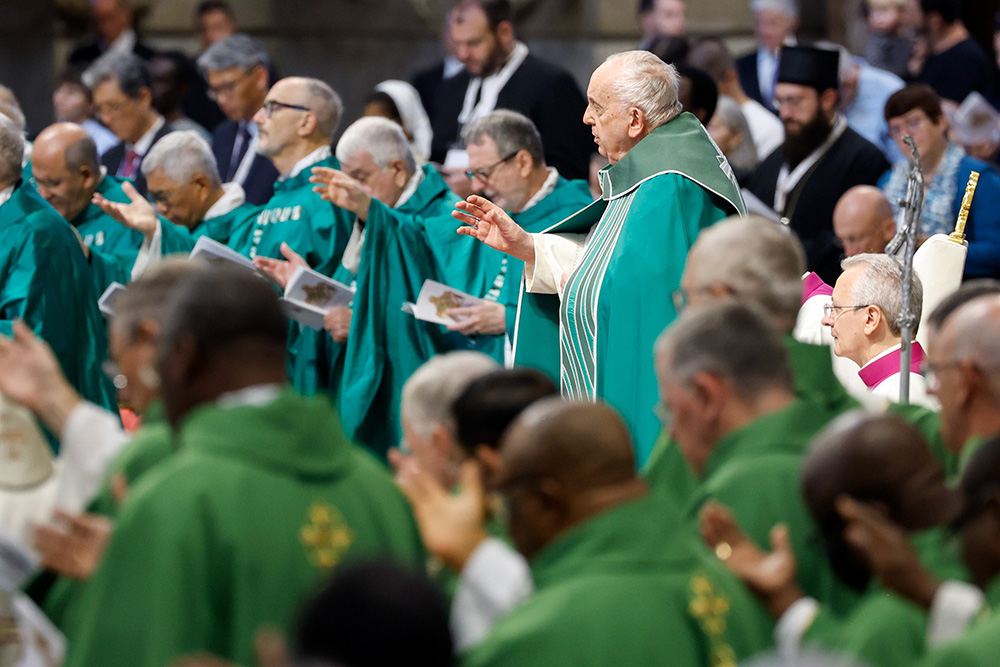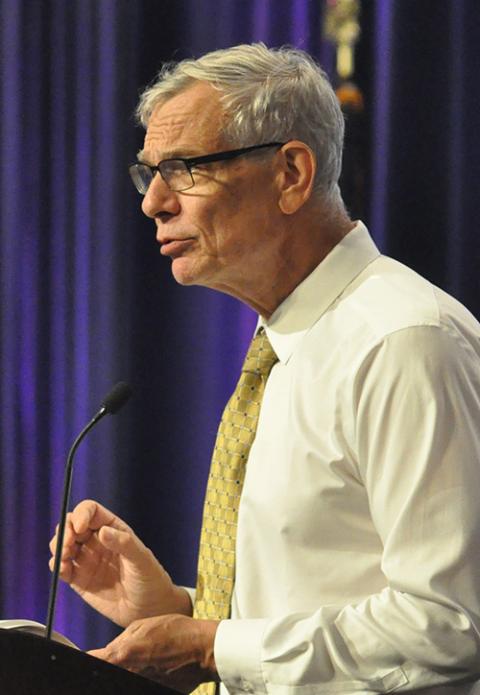
Pope Francis prays during Mass in St. Peter's Basilica at the Vatican Oct. 29, marking the conclusion of the first session of the Synod of Bishops on synodality. (CNS/Lola Gomez)
Theologian John Cavadini, director of the McGrath Institute for Church Life at the University of Notre Dame, penned an important article about the synthesis document that summed up the deliberations at the recently concluded Synod of Bishops in Rome. Unlike some of the recent commentaries I have seen, Cavadini's raises important questions about the document and does so in a respectful and thoughtful way.
He is not trying to undermine the synodal process nor is he hurling accusations against its organizers. As he notes, the document itself invites the church "to continue deepening our understanding pastorally, theologically, and canonically."
Cavadini's focus is on the ecclesiology of the document and, specifically, the way synodality constitutes an ongoing part of the reception of the 1962-65 Second Vatican Council and its teaching, specifically in Lumen Gentium, the Dogmatic Constitution on the Church. This is the thing that too many conservative critics of Pope Francis forget, that his efforts at reform are rooted in the reception of Vatican II and that in Latin America, the council was received differently to date from the way it has been received here in the U.S.
Let's repeat the words "to date." Receiving the teachings of an ecumenical council is the work of a century.

John Cavadini (CNS/The Criterion/Sean Gallagher)
The synthesis document repeatedly focused on baptism as the source of synodal ecclesiology. "Synodality claims to develop a primary feature of Lumen Gentium's ecclesiology, namely, its recovery of the idea that all of the baptized, by virtue of their baptism, are called to contribute to the mission of the Church," Cavadini writes. "It 'values the contribution all the baptized make, according to their respective vocations.' "
Cavadini adds, "Synodality values the title 'People of God' for the Church, correctly associating this title with the idea that baptism calls all to contribute to the mission of the Church."
The burden of his essay is to point out that Lumen Gentium not only focuses on the image of the church as the "People of God," but also of the church as "Mystery." And, in the synthesis document, it is the former focus that predominates over the latter.
"The Church is 'mystery' because it is born primarily of Christ's sacrifice on the cross," Cavadini writes in one of the especially beautiful paragraphs in his article. "The sign of this is the blood and water, symbolizing Eucharist and baptism, the two main sacraments of the Church, that flowed from the side of the crucified Jesus (see Lumen Gentium, 3). The Church is therefore a mystery of Christ's sacrificial love."
That passage is not only beautiful but it points to something I discussed in a column when the synod was beginning, namely, that our theology must be rooted in the sacramental life of the church. There, I quoted the late Puerto Rican theologian Msgr. Lorenzo Albacete:
The Liturgy is the expression of the faith of the Church. ... The Liturgy has immense power and authority, because it is the most authoritative gesture of the Church. Everything else, such as the Magisterium, exists to make the Liturgy and the Eucharist possible. We know that from the Council: "The Eucharist is the source and summit of the life of the Church." Everything in the Church is directed to it. So, we must follow the Liturgy of the Church. We must bring ourselves to the heart of the experience.
How similar those words are to Cavadini's observation that "baptism is itself ordered towards the Eucharist (see Presbyterorum Ordinis, 5), which completes Christian initiation. It is therefore the Eucharist that ultimately 'makes the Church' (Catechism of the Catholic Church, 1396), not baptism, because it is the sacrifice of Christ that makes the Church, and the Eucharist is the sacramental re-presentation of that sacrifice."
The relationship of baptism to Eucharist grounds and shapes the relationship of the priesthood of all believers with the priesthood of the ordained. Before Vatican II, our Catholic ecclesiology neglected the priesthood of all believers and Vatican II corrected that neglect. It did not eliminate the priesthood proper to the ordained.
We are still figuring out how the two are related and that theological discussion gets above my paygrade pretty quickly.
Advertisement
The synthesis document touches on this issue most explicitly in Section 12, "The Bishop in Ecclesial Communion." Paragraph "g" states:
The question of the relationship between the Sacrament of Holy Orders and jurisdiction needs to be studied in greater depth. In dialogue with Lumen Gentium and more recent teachings such as the Apostolic Constitution Praedicate Evangelium, the aim of such a study would be to clarify the theological and canonical criteria underlying the principle of the shared responsibility of the bishop and to determine the scope, forms and implications of co-responsibility.
In Praedicate Evangelium, the apostolic constitution on the reform of the Vatican Curia, certain positions previously reserved to clerics were opened to the laity. As a functional matter, no deep theological issues are involved because all posts in the Vatican Curia possess a derivative authority from that of the pope.
The functional question is how similar changes of a functional nature can be made without departing from the ecclesiology of Lumen Gentium. The theological question is how that ecclesiology can and should be developed. Lumen Gentium is the authoritative teaching of the church but it is not the final teaching on the church.
What distinguishes Cavadini's essay, however, is not only its erudition. It is his engagement with the ideas the synod produced. He does not join the ranks of the opposition. His sense of the church is too profound for that.
Cardinal Raymond Burke told a meeting in Rome, "Our Lord Jesus Christ, who is our only savior, is not at the root and center of synodality."
Sydney Archbishop Anthony Fisher published a pastoral letter citing an article from Catholic News Agency, hotbed of opposition to Pope Francis, that claimed the synodal process "doesn't deliver theological clarity." Fisher quotes Jesuit Fr. Anthony Lusvardi who told CNA that St. Ignatius of Loyola made clear that "not everything is the proper object of discernment. If something is a sin, you do not discern whether to do it or not."
That is not helpful.
Cavadini's essay is helpful. It raises important questions about important issues and does so without demonizing anyone or rejecting the synodal process itself. It is an important contribution to the ongoing reflection that should characterize the next 10 months before the second session of the synod meets next autumn.







